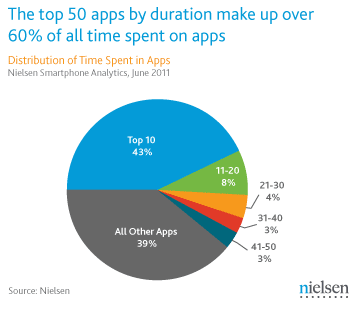Web or App? Nielsen study knows usage time of Android smartphone users
According to the latest findings of research firm Nielsen that tracks and analyses iOS and Android data, smartphone users spend twice as much time on applications than on mobile version of these websites. The study reveals also that –although there are millions of apps in the world- only “a very small proportion of apps make up the vast majority of time spent”.
The average Android smartphone user spends 56 minutes a day using apps and browsing the internet. Two-thirds of that time is usage of apps, the rest goes to mobile websites and 39% acccount for consumer app consumption. The study illustration below shows that mobile device owners spent almost half of their usage time on their top 10 favorite apps and 51% on their favorite 20 apps.

Let’s give it a guess… Probably most of the app usage of mobile device owners accounts for the following usage time: Checking email apps, Facebook, Foursquare or Gowalla, Twitter, and some of their favorite and coolest news or geeky gaming apps (very often used by their kids). And if you look at the top (free) list of apps you find Angry Birds, Angry Birds Rio, Google Maps, YouTube, Facebook Mobile, Skype, Tiny Flashlight, Viber and Drag Racing amoungst others.
The study supports my own feeling that although we continue to download apps and spend (2010 per user: Android 1,97 USD, iPhone 21,22 USD), we only use most of them them periodically, and only a few continously if the give us permanent benefit in networking or staying up-to-date on news.
Well, the time will come when HTML5 might change the market situation and developers will have an easy time working with apps. Amazon’s Kindle Cloud Reader gives insights in what is possible with HTML5 for the mobile web.
Spot On!
The study does not really give an answer to the question yet, or can give a recommendation to management. Still, Seeing these numbers, just imagine the chances companies and brands have when launching a new app to get under the hiflyer apps in the smartphone user market. Ideally, think about the five strategic reason that could make your app successful and be aware of the fact that most brand apps fail.

 What will companies say if employees want to bring their own devices to work? How about security issues and support opportunities for companies? A real challenge for the future when we look at an
What will companies say if employees want to bring their own devices to work? How about security issues and support opportunities for companies? A real challenge for the future when we look at an  It seems to be a love and hate relationship: Executives and Social Media. On the one hand, companies see how
It seems to be a love and hate relationship: Executives and Social Media. On the one hand, companies see how  Although the mobile hype is massive, there are studies that question the power of smartphone mobile advertising and it’s efficiency. A new
Although the mobile hype is massive, there are studies that question the power of smartphone mobile advertising and it’s efficiency. A new 

 Jive Software recently published a
Jive Software recently published a 

 Sponsorships on retail sites are more likely to convert into sales than clicks on organic search engine results… and visitors will spend more. This is what a
Sponsorships on retail sites are more likely to convert into sales than clicks on organic search engine results… and visitors will spend more. This is what a